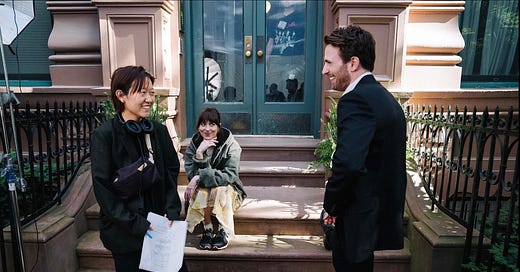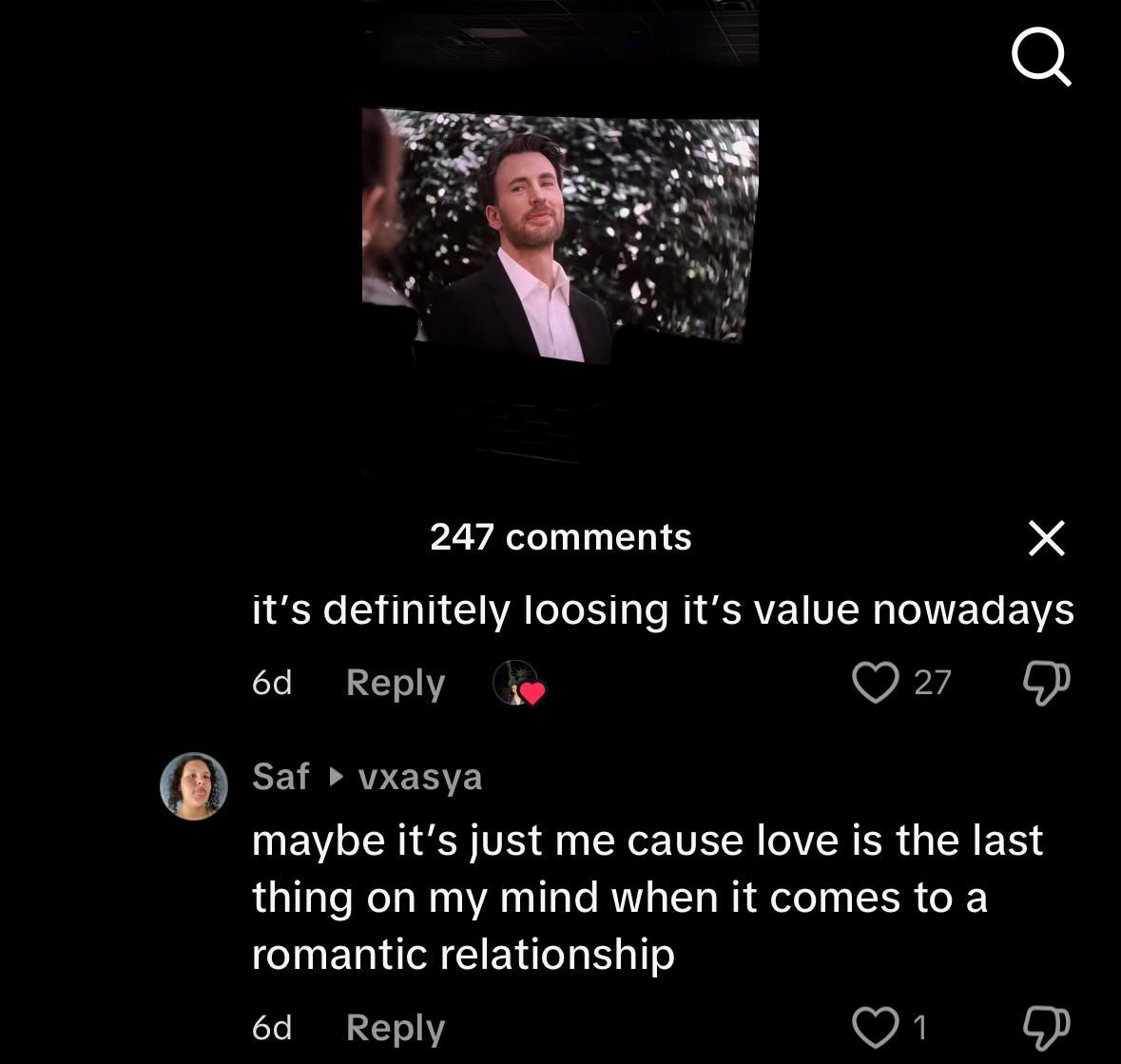A few weeks ago I wrote about Celine Song’s Materialists.
In it, I expressed my desire to see Song change up a romance trope that I find tired and, quite frankly, boring. I wanted her to let the protagonist be a materialist without reservation, without shame. Before the movie came out, I actually believed this would be the case, but now that I’ve seen it, I was very wrong.
I want to clarify by saying I love this movie. I’ve been seeing a lot of backlash online about how they felt misled, that the movie was marketed as a romcom and it turned out to be a drama that had a major plot line involving SA, something that I do believe should have been stated, or at the very least, alluded to in the trailers. There are also many others who have labeled the film “broke man propaganda” because Lucy chooses John, the 37-year-old man with $2,000 in his bank account and roommates in a tiny New York City apartment over Harry, the rich, handsome, charming man who works in finance (though the details of his job are dubious). Before watching the film, I thought that if Lucy chose John, I would feel upset, or even just vaguely irked. I thought I wanted to watch a movie that better represented the economic state of today, but what I thought I wanted wasn’t actually what I wanted, and I didn’t come to that realization until the credits started rolling. I’ve praised Song’s work plenty of times before, but I have to really stress how spectacular her writing is. Despite the film ending in perhaps the most predictable way possible, the way it was done, the words that were spoken, they remained so poignant, so authentic, so emotionally charged, I couldn’t help but fall in love with Song’s earnestness all over again.
Lucy’s job as a matchmaker is to make sure her clients are set up with their ideal partner. She sees numbers, not people, and though in her line of work that makes complete sense, she realizes that the math of it all starts to bleed into her personal affairs as well. Whether people want to admit it or not, you can’t go into a relationship with a checklist of requirements that need to be met exactly. It’s impossible to find a partner that meets every requirement, and I think the problem is people assume one is settling for less when they don’t. Dating becomes a numbers game, an interview process, not a conversation. Love isn’t something you can calculate with an equation, it’s just a feeling, something that I found, depressingly, isn’t a priority for a lot of people.
“If the service I was providing you was building a man, of course I would build you a man with everything on this list, but I can’t, because this is not a car or a house. We’re talking about people. They come as they are.” -Lucy
I do think that people’s reactions to art is indicative of the current political and social climate. The negative reactions towards Lucy’s decision are upsetting to see, but I do understand it. A lot of people are struggling right now, and money does seem to be the answer to most problems, but the value of a romance shouldn’t just be monetary. I say “just” because money will always be part of the conversation. Dates, gifts, marriage, children, regardless of how in love someone is, money should be discussed during certain pivotal moments in one’s relationship, but what the film is trying to say is that money shouldn’t be the first or the only thing keeping you in a relationship. Harry’s character was, despite his shady and immoral job, kind to Lucy, but neither of them were in love. He admits this in the film, that he thinks there’s something wrong with him, that he has never felt love. Lucy tells him that when it happens, he’ll know it instantly, and that he won’t have to try to force those emotions as he was with her.
There’s another criticism being levied at the film, one that I find perhaps more upsetting. There are many who say that Lucy shouldn’t have picked John either because, sure, he loves her totally and unconditionally, but they originally broke up for a reason, and that getting back together would just be continuing a broken cycle, and that John’s character didn’t actually change or improve to justify Lucy’s decision to get back with him. I really only have one thing to say about this: Were you watching the movie with your eyes and ears closed? Did you miss the speech John gave detailing the ways he will change, the ways he’ll pick up more shifts, listen to her advice, work on moving to a new apartment, never taking her for granted? Did you miss the part where he wrote and starred in a play of his own creation, on his own terms? By the end of the film, there’s an unclear time jump, but judging by the happiness the two of them display, judging by her desire to say “yes” and marry him, John clearly put in the work to better himself for her.
“I’m a beggar for you. When I see your face, I see wrinkles, gray hair, and children that look like you. Can’t help it.” -John
No, I don’t believe the film is “broke man propaganda.” People tend to dish out buzz words when something didn’t go their way. That’s just an unfortunate side-effect of being on the Internet. When I wrote my original Materialists post, I was so focused on doing math, on looking at a man, pen and paper in hand, checking all of the boxes I believed any sane person would want in real life, that I almost forgot that what I really crave is true love. The world is so devastating, so tiring, so awful these days, I’ve become a cynical, dare I say, annoying person, a person that was too busy putting myself in Lucy’s shoes before even watching the film, demanding that she choose the man with the $12 million apartment rather than the man she could see herself spending the rest of her life with. I lost sight of that, and Song reminded me of why being in love, loving someone regardless of their flaws, is so important, why love is what people live and breathe for.







Whether people want to admit it or not, you can’t go into a relationship with a checklist of requirements that need to be met exactly.
Facts😔